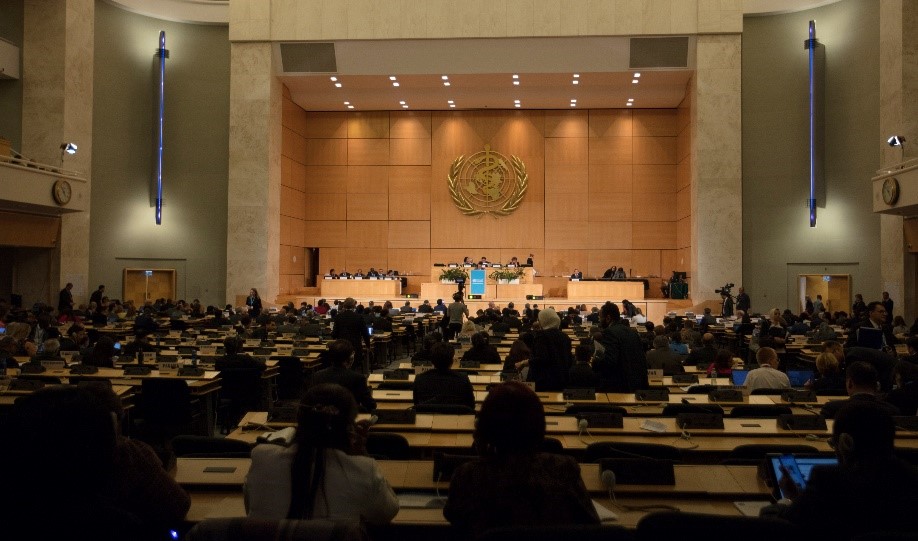Young People’s Priorities in Global Health ahead of the 77. World Health Assembly

As part of the Federal Ministry of Health's Youth Delegate Programme for the World Health Assembly, Youth Delegate Eva-Lotte Seibold held 14 youth consultations. Here she summarises the most pertinent priorities and concerns coming out of these consultations.
This article is based on consultations with twelve youth organizations representing young people within the healthcare sector[1] and two online youth consultations that were open to the general public.
Primary Prevention & inter-professionalism
Primary prevention and inter-professionalism within the healthcare system have emerged as central topics during the consultations. German youth advocate for structural prevention as a tool to promote better health and well-being in the general population, mitigate the effects of demographic change, lower the incidence of non-communicable diseases (NCDs), and reduce the healthcare system's carbon footprint. Therefore, easily accessible and needs-based health counseling, screening exams, and long-term support should be made available and financially compensated for. This could, for example, involve community health nurses, pharmacies, physical and occupational therapists, or midwives during and after pregnancy. Such initiatives are especially beneficial for children and elderly persons, for example, the promotion of breastfeeding through programs like the baby-friendly hospital initiative or gerontological physical therapy to maintain independent living.
Further, youth call for more structural prevention measures, including stricter regulations on the advertisement and sale of alcohol and tobacco, as well as the promotion of healthy diets and exercise in daily routines, for example through walkability concepts or more bike pathways. Integrating kindergartens, schools, and occupational health services into these efforts is essential. German youth emphasize that for a healthier society, interprofessional and patient-centered care is the key, as highlighted by this year's WHA theme “All for health, health for all”.
Climate change & health
Another central topic of the consultation was the interaction of climate change and health. What we see in this area, among other effects, is a strong interdependence of human and animal health, underscoring the need for research on climate change´s effect at this nexus. One aspect in this area was of special importance to youth: The decarbonization of the healthcare system. While climate change significantly impacts healthcare, the sector itself contributes approximately 5% of global carbon emissions. Reducing these entails considering carbon emissions in treatment decisions and, if the therapy is equivalent, opting for the emission-neutral, such as physical or occupational therapy, or emission-reduced option, for example, using sevoflurane instead of desflurane as an inhalational anesthetic. Additionally, prioritizing research for environmentally friendly synthesis and production of pharmaceuticals is crucial. Also, hospitals should adhere to the planetary health diet in patient meals as well as in their cafeteria offerings.
Another aspect that was accentuated is the adaptation of the healthcare system to climate change, particularly extreme heat events. These events lead to various adverse health events, for example, higher incidences of stroke and cardiovascular events, with a disproportionately negative impact on marginalized groups such as women, children, elderly persons, persons with disability or chronic medical conditions, persons with low socioeconomic status, and migrants. Therefore, urgent action is needed to develop and implement national heat adaptation plans with an intersectional focus. Youth also argue for enhanced climate-specific health literacy, or “climate literacy”, to mitigate the effects of climate change on health, this should for example include the effect of heat on medication efficacy.
Climate change & mental health
The negative impact of climate change on mental health is also a concern for young people in Germany. It arises from both the traumatizing effects of extreme weather events and worries about climate change. Young people are especially vulnerable to this because the children and adolescents of the present will have to bear the main burden of climate change with limited resources to mitigate the effects of these stressors. Strategies to protect the mental well-being of young people amidst this crisis are needed, including offers for psychiatric and psychotherapeutic care for those especially affected, and more research efforts to better understand this effect are needed.
Moreover, youth call for the integration of the effect of climate change on health and the healthcare system's contribution to climate change, as well as strategies to mitigate these effects into the curriculum of future healthcare workers.
Other topics that were of importance to German youth, but mentioned less frequently, were:
The mental health of young people working in the healthcare sector, sexual and reproductive rights, antimicrobial resistance, the need for digitalization of the healthcare system, and infectious diseases.
[1] Namely: Bundeslernendenvertretung im Deutschen Verband Ergotherapie e.V., Bundesvertretung der Medizinstudierenden in Deutschland e.V., Bundesvertretung der Pharmaziestudierenden in Deutschland e.V., Bundesverband der Veterinärmedizinstudierenden in Deutschland e.V., Bundesverband der Zahnmedizinstudenten in Deutschland e.V., Globalisation and Health Initiative, Junge Pflege im Deutschen Verband für Pflegeberufe e.V., Junges Physio Deutschland, Junge und werdende Hebammen im Deutschen Hebammenverband e.V., Studierende im Berufsverband Deutscher Psychologinnen und Psychologen, and Studierende in der Deutschen Gesellschaft für Public Health.
Disclaimer: The opinions presented here are not representative of all adolescents and young adults in Germany. They merely represent a selection of the opinions of the participants in the youth consultations.
Bildquelle: S. Mission Photo/Eric Bridiers
Learn more about the German Youth Delegate Programme
YOUTH DELEGATE PROGRAMME OF THE GERMAN FEDERAL MINISTRY OF HEALTH
EXPERIENCE REPORT FROM THERESA KRÜGER FROM THE YEAR 2021 (ONLY IN GERMAN)
EXPERIENCE REPORT FROM ANILE TMAVA FROM THE YEAR 2022 (ONLY IN GERMAN)
EXPERIENCE REPORT FROM MIRIAM EL-MAHDI FROM THE YEAR 2023 (ONLY IN GERMAN)